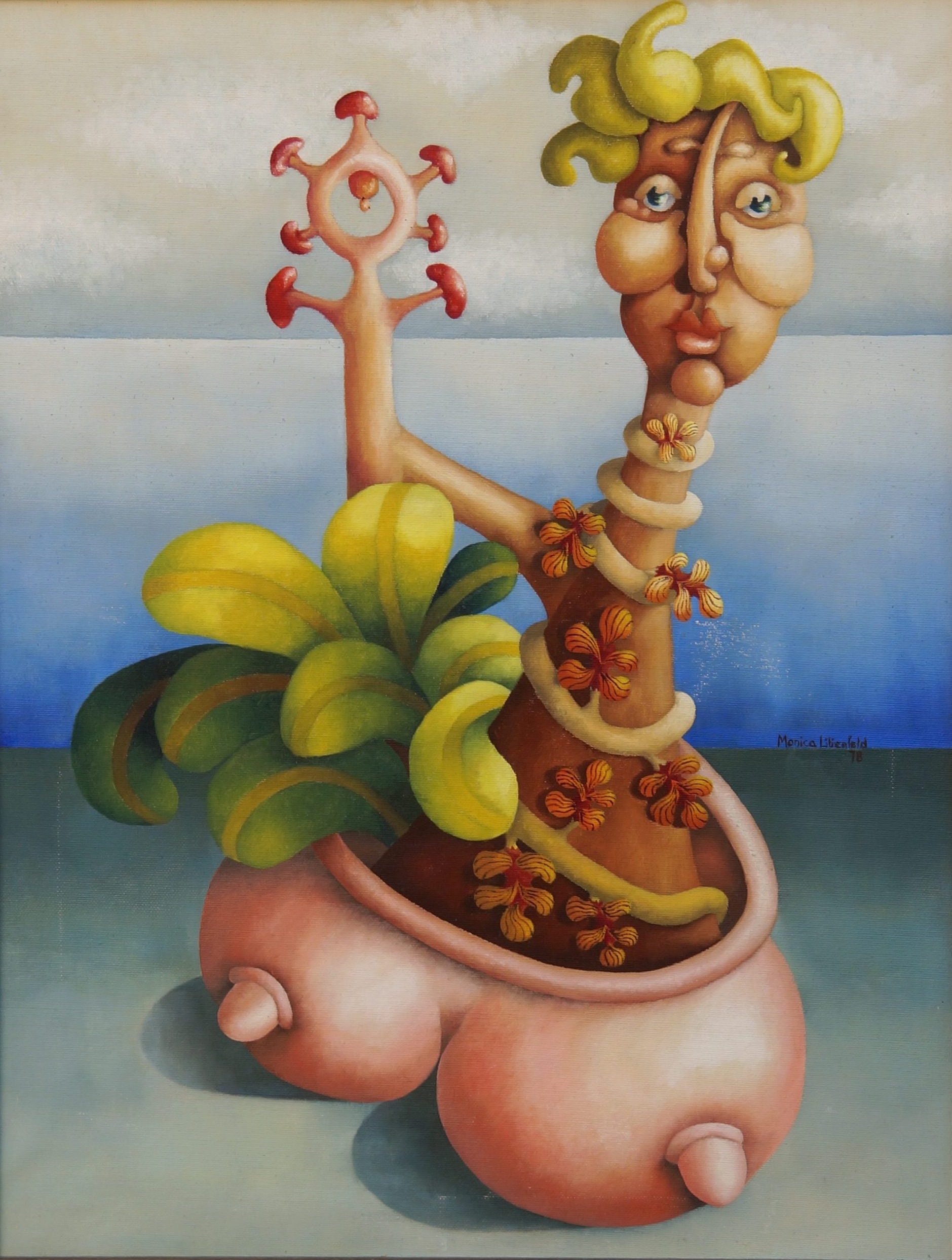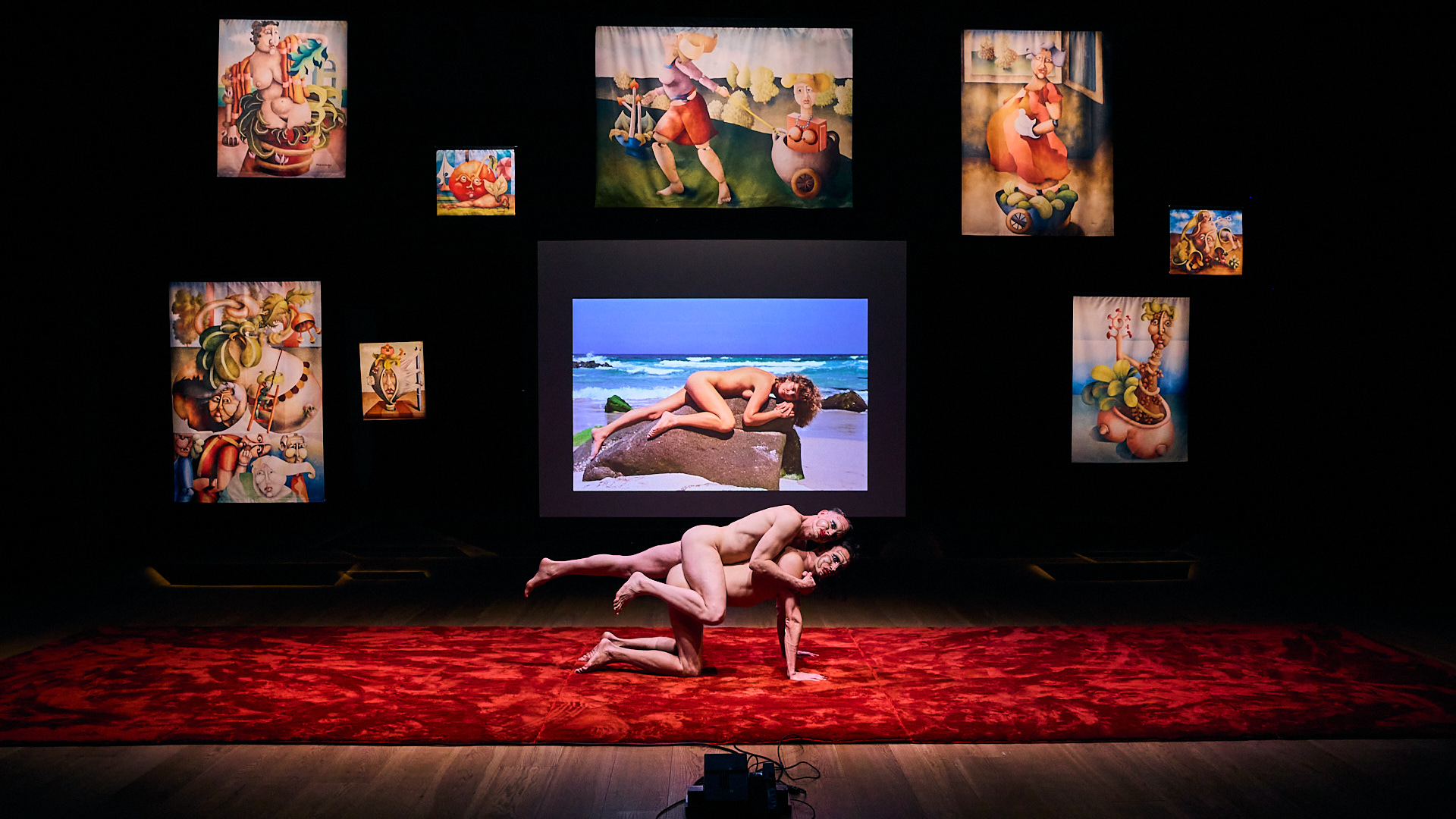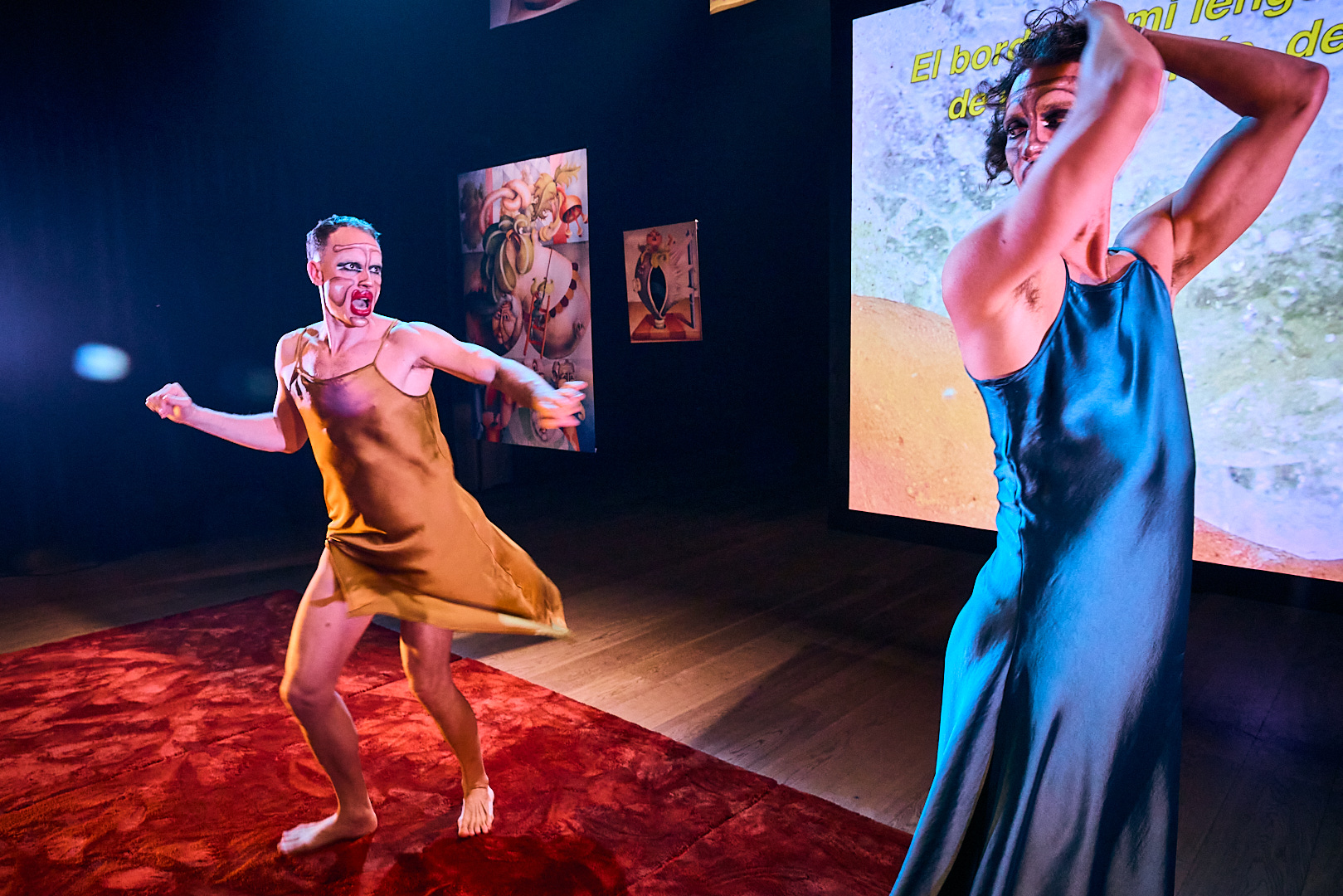MONICA
Monica Lilienfeld (Pablo’s mum) was a painter who died very young, in 1986. Monica Pezdirc (Fede’s mum) posed nude throughout her life in the erotic photographs taken by her husband. The paintings and photographs created by our mothers form the basis of this work, which interweaves our diasporic genealogies and explores the performativity of images.
In Monica the trees of traditional genealogy intermingle, forming a web of non-heteronormative maternities and speculative telenovelas. A genealogical ecology is thus formed in which not only the epic of wars, migrations and other patriarchal-historicist narratives coexist, but also those that have been left out.
PRESENTATIONS
Monica
01+02/05/2026
Battersea Arts Centre, London
Monica, a game for diasporic genealogies (workshop)
25/04/2026
Battersea Arts Centre, London
Monica
13+14/02/2026
It Takes a City, Brussels
Monica
9/12/2025
Viernulvier / NTGent / Europalia, Gent
Monica
7/11/2025
Concertgebouw / Danse in Brugge / KAAP / Europalia, Bruges
Monica
4/10/2025
De Singel - BLISS #3, Antwerp
Monica (Belgian premiere)
12+13/06/2025
Kaaitheater, Brussels
Monica
16/05/2025
Corufest - Teatro Rosalía, A Coruña
Monica (Spanish premiere)
10+11/05/2025
Mercat de les Flors, Barcelona
Monica - Episodio 5: Bajo el sol cegador (gallery format)
27/09/2024
Lazos Mecánicos. Artium, Vitoria
Monica - Episode 4: Ultraviolet stroke (work-in-progress)
21/04/2024
Open Studios. Kaaistudios, Brussels
Monica - Episode 3: Stranded statue (work-in-progress)
12/04/2024
Tanzhaus Zurich
Monica - Episodio 2: La quiero ver bailar (work-in-progress)
21/10/2023
Hacer Historia(s), Barcelona
Monica - Episodio 1: Déjenla sola (gallery format)
8+9/11/2023
Festival Plataforma, Santiago de Compostela
CREDITS
A project by Federico Vladimir & Pablo Lilienfeld
Based on the paintings by Monica Lilienfeld and the photographs by Monica Pezdirc and Federico Strate.
Music by Pablo and Fede, created in collaboration with and sung by Sophie Taylor, Janet Novas, Cris Blanco, Adriana Reyes, Anaël Snoek & Bunny Cadag
Video by Fede and Pablo in collaboration with Quiela Nuc
Video guest stars: our nieces and nephews
Digital environment: NastPlas
Voiceover: Anaël Snoek
Monica Lilienfeld’s voice: Monica Kerner
Dramaturgical advice: Simon Baetens
Movement advice: Mario Barrantes
Scenography: Špela Tušar & Carmen Triñanes
Light design: Iván Cascon
Costume design: Aarón López
Make up design: Esther Quintas
Portraits of Fede & Pablo: Juan Papagnimeca
Additional instruments: Yamila Ríos & Rafael Cereceda
Genealogy advice: Regula Bochsler
Paintings documentation: Santiago Esbert
Production: AnAku
Co-production: C-TAKT, Mercat de les Flors, workspacebrussels, Viernulvier and Spanish Embassy in Belgium.
Residency support: Kaaitheater, Graner, C-TAKT, workspacebrussels, Tanzhaus Zurich, Paraíso / MIT, La Poderosa & Auditorio de Tenerife
With the support of de Vlaamse Overheid
Thanks to Bâtard Festival, Sabine Cmelniski, Martin Zícari, Jesús Ubera, Sonia Gomez, Conchita Pons, Norberto Llopis, Mentah, Raúl Querido, Alejandro Marani, Carina Erdmann y Caroline Godard.
PRESS REVIEW
Monica, a tender epic
“Pablo Lilienfeld and Federico Vladimir share their lives as both romantic and artistic partners. They also share the fact that both their mothers are named Monica. In Monica, they weave together their own life stories with those of their mothers, grandparents, great-grandparents, and even their future children. This tender epic blends performance, drag elements, and storytelling into a well-crafted, interdisciplinary piece. They explore their personal idea of what it means to “represent”: how do you present yourself, and what is the role of embodiment in a world saturated with images?”
As you enter, you see various paintings displayed around a softly illuminated yellow projection screen. Behind it stand two backlit silhouetted figures—a welcome into the Wunderkammer of Pablo and Fede, and the many Monicas that will appear throughout the performance. In a gentle tone, Lilienfeld and Vladimir begin the performance by speaking—promising not only a story about their mothers, but also about their ‘child’ Monica.
The life stories of the various mother-Monicas are interwoven with broader historical contexts. Both grew up in Argentina and later emigrated to Spain. However, their paths differ—together, they evoke a significant portion of European history: from the rise of fascism causing flight, to collaboration and displacement, the emergence of the Soviet Union, Jewish communities in South America, and some eventually finding their way back to Europe. Monica Lilienfeld (Pablo’s mother) passed away in 1986, leaving behind a large number of paintings. These images are placed alongside nude photographs of Federico’s mother, taken by her husband. While one Monica remains immortalised in her paintings, the other Monica ages in the photographs. Pablo and Federico adopt poses from the images by their mothers—performingmostly naked, with make-up that, with a few small spots and lines, surprisingly efficiently creates a drag layer. The mother-Monicas’ stories and poses are interspersed with poems by Monica Lilienfeld set to music, more theoretical reflections on representation, and lip-sync performances—another layer of drag—of songs including one by Janis Ian.
The photograph, or the painting, are in themselves images, representations, of the “real”, physical Monicas -and in turn Pablo and Federico’s bodies take on those representations. However, adopting postures is not simply a matter of (re)presenting something absent, to representing it in the literal meaning of representation. Rather, for the creators-performers, to represent means to be there, to stand there, not only in function of what you bring back (re-present), but above all for yourself. The gentle, stimulating friction between their bodies and those of their mothers, and between the different media, indeed opens up another way of being present: open, multiple, less defined. As they themselves say: representation is not merely about similarity, about embodying a predetermined meaning. Instead, to represent is to open possibilities that arise when earlier codes and systems—whether about gender, family structures, or identity—are absent or released. This is where the drag aspect, which is rather subtle (at least in comparison with the often more exaggerated or explicit gender bending of drag performance), comes into its own.
Thanks to their conception of representation, they remain autonomous—not dependent on the gaze (though they may enjoy being seen). “We don’t need to be looked at. We are going to continue to be here,” as they say. It is not about external validation. It is about their own open, multifaceted presence. The combination of images, bodies (both mentally invoked through stories and physically present via photos, paintings, and performance), and shared ideas conjures a different kind of “presence-in-potentiality.” This presence is both speculative (since it has not yet been fixed or fully defined) and grounded (in, among other things, the histories). It is itself an example of emancipation within interconnection. What’s intriguing is how this performance draws a line from personal and social history toward opening up a multiple future.
This unfolding happens almost literally when Pablo and Federico step offstage to let a projected video take center stage. In it, images from a fictional, clichéd art documentary – including the typical “semi-enthusiastic” intonation of the presenter, played here by Pablo and Federico, again with voice-over – are mixed with images of the two of them making collages, applying drag make-up, performing and telling stories with a group of children. On a beach, in a theater hall, in a bedroom or an atelier—the role-play continues in this video work, again blending different media. The children, Pablo and Fede's nephews and nieces, are also the older nephews and nieces of Monica – the announced child of both performers.
In a growing number of countries, drag with and for children would once again lead to moral riots, but here it is shown in a disarmingly playful way—it is fundamentally about play, about holding contact with potentiality—and the imagination that is our freedom. Making such potentiality our own—how we are and present ourselves through it: that is representation. But in addition to that power, there is also a certain innocence and naivety in this. The children, like Pablo and Federico, wear nightgown-like garments, and the tenderness of some stories even feels like bedtime tales.
Monica has something epic about it, because the story spans at least four generations (and who knows how many more yet to come), and because of its length (which is not distracting, because it is consistently high in quality). It is epic, but without pretension. Pablo and Federico choose humor, tenderness, and craftsmanship in constructing the whole. Funny, disarmingly honest, they tell stories about the big themes in life: love, loss, relationships, growing old (both aging and having children), imagination.
Despite the grand themes, Monica always returns to the love between these two performer. Their love is expressed in their artistic kinship and how they share the stage with each other, their mothers, grandmothers, their nieces and nephews, and their own creation: their daughter Monica.
When we finally arrive at their child, we enter a realm of artificially generated images. We see the Monica-the-child as a virtual creation—perhaps the ultimate embodiment of potential: always digital, never fully graspable, generated by its makers and a slippery algorithm. She appears briefly then disappears again, merging into the image and being carried into the digital world, towards even more multiple forms and deformations that are possible and may become possible. For a while, they wave goodbye to their daughter, as her presence unfolds—moving toward her own presence. This scene speaks about parenthood, but also about artists letting go of their work when it meets the world and discovers and develops a presence of its own through that encounter.
Thus, the circle is complete: whether it's about Pablo and Fede as performers, their mothers Monicas, their child Monica, or their performance: the (self-)creation remains open. As a spectator, you have experienced something special: this performance builds its own potentiality, as it were: it becomes more multifaceted as it progresses. In this way, it emancipates itself from our gaze, but that does not mean that it does not want to be “with us”. On the contrary, spending time together without expectations, experiencing possibilities together: isn't that the fundamental meaning of freedom?
Kristof van Baarle for etcetera
















